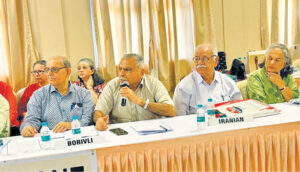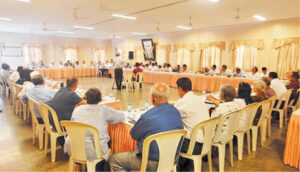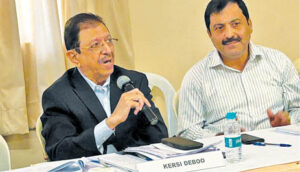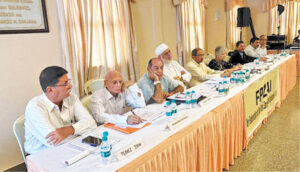The Federation of Parsi Zoroastrian Anjumans of India (FPZAI) held its Annual General Meeting on 21st and 22nd January, 2023, after a gap of nearly three years due to Covid restrictions, at the Banaji Hall (Banaji Atash Behram Compound), in Mumbai.
Attendees:
35 Anjumans attended the 2-day meeting, hosted by the Bombay Parsi Punchayet. The representatives of Anjumans attended the meeting from Ahmedabad, Bardoli, Belgaum, Billimoria, Bhusawal, Borivili & Suburbs, Bombay Parsi Punchayet, Bulsar, Chikli, Daman Vapi, Davier, Gandevi, Iranian, Ilav, Jabalpur, Jhansi, khergham, Mandvi Mangrol, Mahuva, Nargol, Navsari, Neemuch, Pardi, Panchgani, Rajkot, Ratlam, Surat, Saronda, Solapur, Tavdi, Thana, Udvada, Vadodara, Vansda, Shree Vyara- Songadh. Kersi Deboo, the Member and Vice Chairman of the Minorities Commission, was also present.
| New Office Bearers Of FPZAI
President: Armaity Tirandaz (BPP Chairperson, the ex officio President of the FPZAI) Anjumans of 5 Zones, with their respective Vice Presidents:
Hon. Secretaries: Viraf Mehta and Anahita Desai |
The major part of the two-day meeting was spent in deciding who should be the Hon. Secretaries, who should be co-opted to the Executive Council, does the President have the power to decide when there is a dispute or does the Executive Council have the power. Though the majority delegates asked for elections for the post of Hon. Secretaries and for the Co-option of 5 members to the Executive Committee, it was not allowed by the President. The BPP Trustees, who are part of the Executive Council seemed split on these issues.
The productive part of the first day of the meeting was the presentation of the Defunct Anjumans Committee (DAC) Report by Sam Chothia, CEO, DAC. He updated the delegates on the properties in different defunct Anjumans and on the status of legal proceedings filed by the FPZAI to safeguard these community properties from encroachment.
Dr. Kavina and his brother, Adil Kavina from Bhusawal were invited by Sam Chothia to provide a first-hand presentation to the delegates of the legal challenges they were facing in safeguarding the properties of Bhusawal Anjuman from land-sharks. They were asked to sign the Custodial Agreement with FPZAI for the latter to help them in their legal matters.
Vispy Ichhaporia of Jhansi also presented his attempts to safeguard community property of Jhansi from our own community members who seem to be trying to personally profit from it. The delegates were appreciative of their efforts.
ZYNG 2.0 was given a platform to make a presentation to the delegates and make them aware of their activities and future plans.
The productive part of the second day was when the representatives of the individual Anjumans spoke about the activities and achievements of their Anjumans, their financial positions, the challenges and problems faced by their Anjumans. Most of the small Anjumans experienced similar problems of shortage of mobeds in mofussil areas, difficulty in safeguarding their properties, lack of funds to be able to look after their Agiaries and properties. Practical solutions for these vexing problems is still awaited.
One of the major issues faced by Anjumans was the shortfall of Mobeds, due to which some Mobeds had to provide prayer services like the Boi in multiple Agiaries. With the hope to alleviate this concern, the World Zoroastrian Organisation Trusts announced schemes and incentives to make Mobedi more appealing for students and their parents for a more secure future.
Discussions took place about the looming Uniform Civil Code and it was felt that a representation be made to the Government about our community’s opposition as it could adversely affect our unique identity. Kersi Deboo’s help was sought to convey FPZAI’s reservations to the UCC.
Court cases filed in the Supreme Court and in the Calcutta High Court by women seeking to change the definition of what constitutes a ‘Parsi’ was also discussed. A resolution was passed that the FPZAI should lend support and do whatever is required to safeguard our unique identity.





Conclusion: The voting pattern in the Constitution of the FPZAI was considered skewed by a few. The FPZAI constitution confers one vote to every Anjuman, immaterial of size. This is a democratic practice that needs to be followed. After all, shouldn’t small Anjumans also have a voice? Many felt that denying the Anjumans of its right to vote marginalises them even further. Questions like “Shouldn’t the focus of the FPZAI be on these small Anjumans of towns, villages which have many problems of vast community properties which are in danger of being encroached, unmanned Agiaries and dimishing populations?” were asked.
While the FPZAI is an umbrella body of all the Anjumans/ Punchayets of India, due to years of unnecessary politics seeping into this organisation, it is rendered nearly ineffective, despite its potential to effectively render practical solutions to nagging problems plaguing our community.
Pic Courtesy: Parsiana and Sarosh Daruwala
- વહિસ્ત તંબોલીને ડોક્ટરેટની પદવી એનાયત - 17 May2025
- પેરા નેશનલ્સમાં યઝદી ભમગરા માટેસુવર્ણ ગૌરવ - 17 May2025
- ડેનકાર્ડમાંથી આપણા માતાપિતાનોઆદર કરવા અંગેના પાઠ - 17 May2025
